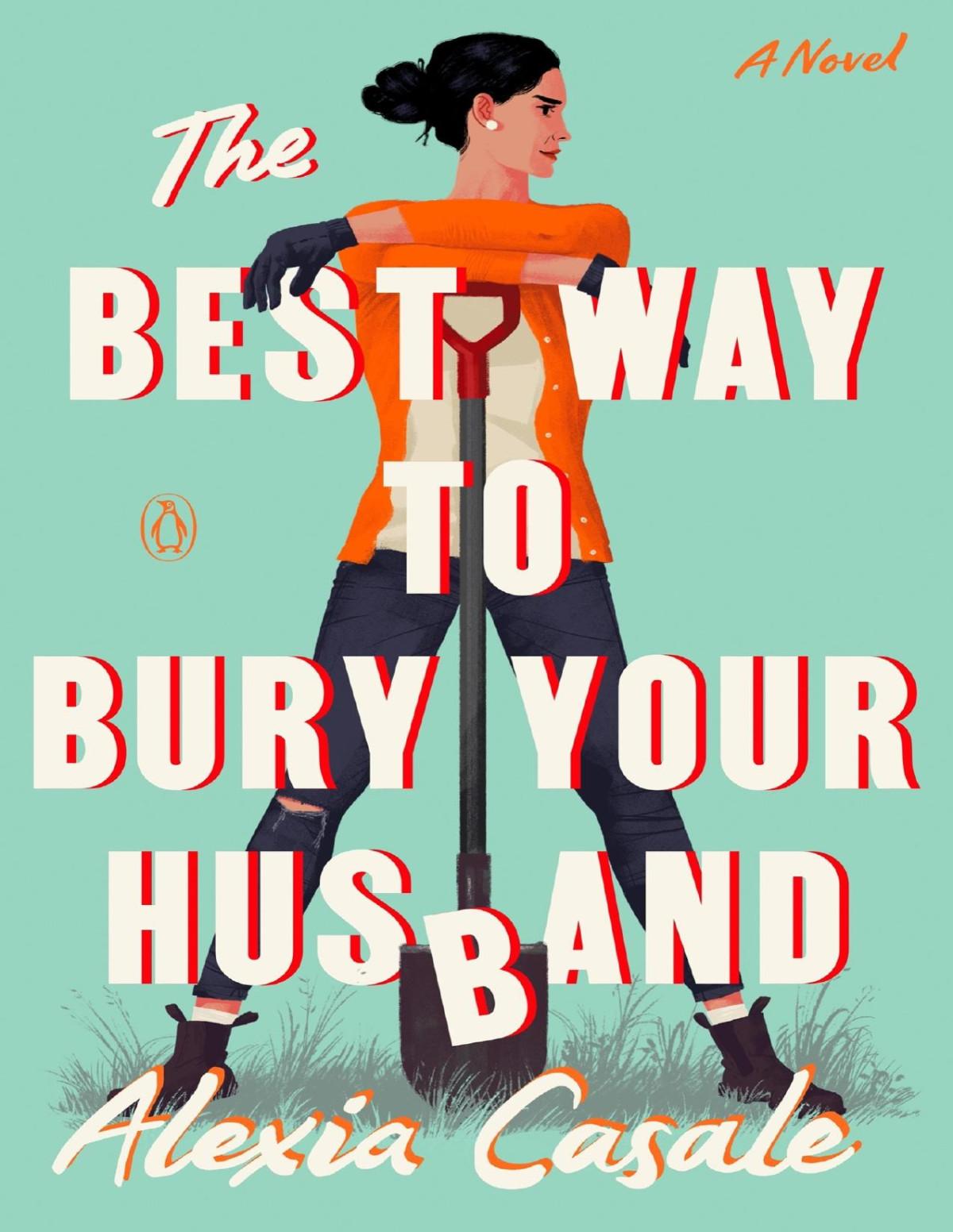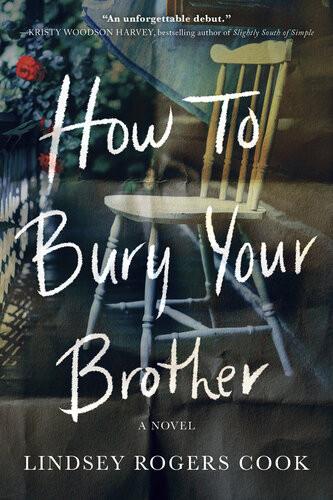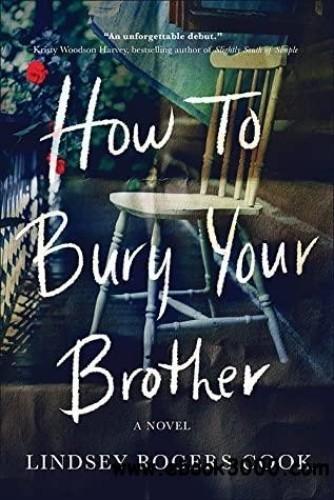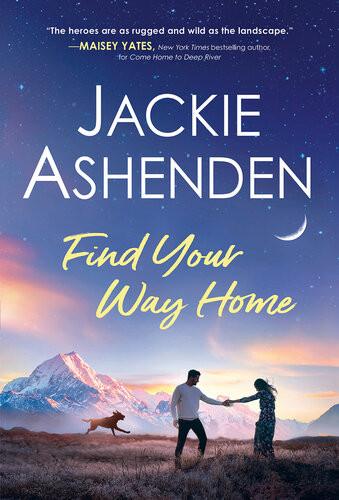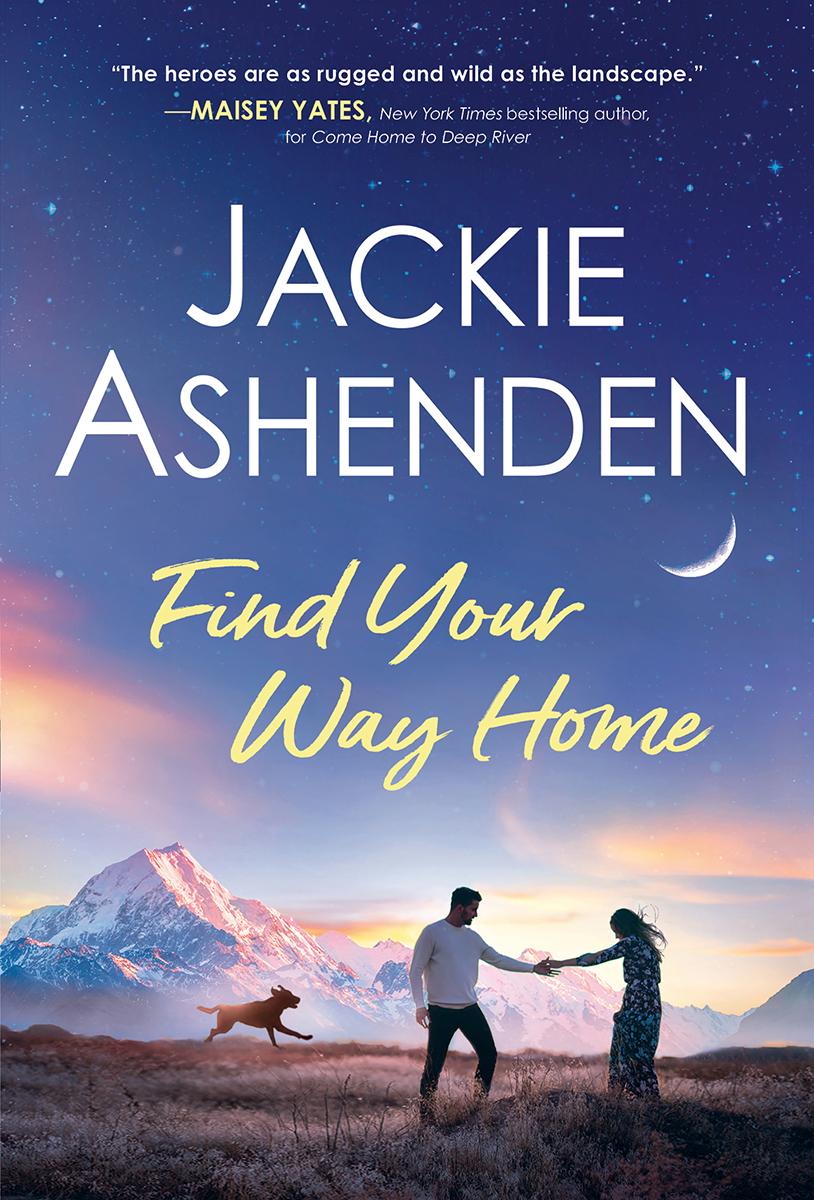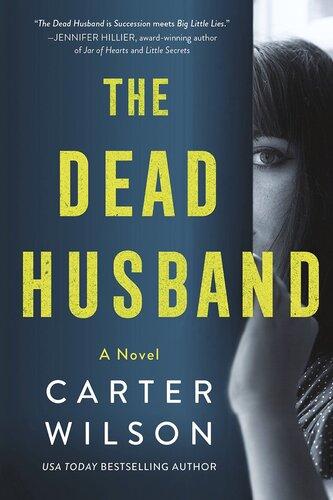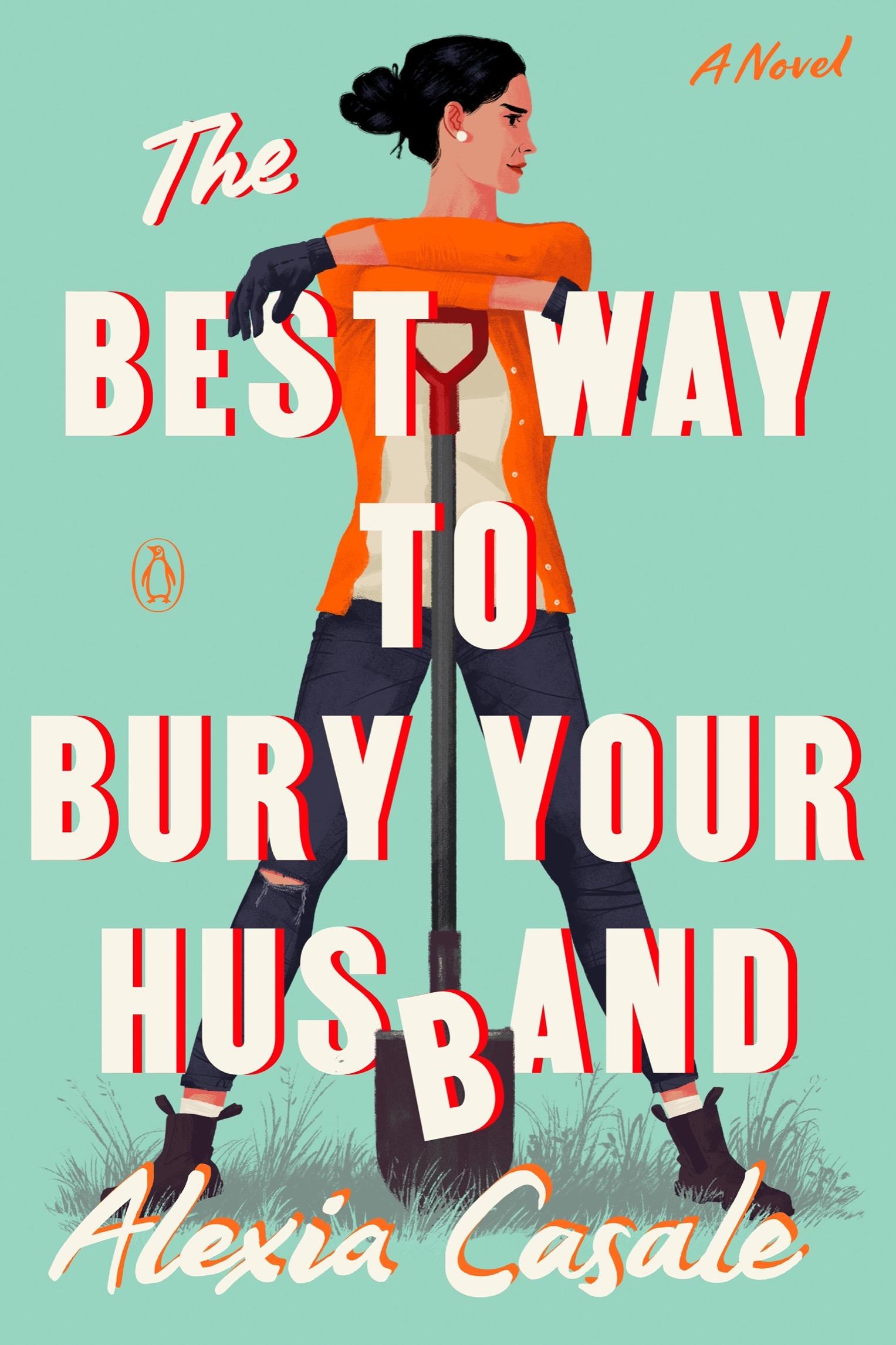Visit to download the full and correct content document: https://ebookmass.com/product/the-best-way-to-bury-your-husband-a-novel-alexia-ca sale/
More products digital (pdf, epub, mobi) instant download maybe you interests ...
How to Bury Your Brother Lindsey Rogers Cook
https://ebookmass.com/product/how-to-bury-your-brother-lindseyrogers-cook/
How to Bury Your Brother Lindsey Rogers Cook
https://ebookmass.com/product/how-to-bury-your-brother-lindseyrogers-cook-2/
Windswept Way--A Hope Harbor Novel Irene Hannon
https://ebookmass.com/product/windswept-way-a-hope-harbor-novelirene-hannon/
Find Your Way Home Jackie Ashenden
https://ebookmass.com/product/find-your-way-home-jackieashenden-2/
Find Your Way Home Jackie Ashenden
https://ebookmass.com/product/find-your-way-home-jackieashenden-3/
Find Your Way Home Jackie Ashenden
https://ebookmass.com/product/find-your-way-home-jackie-ashenden/
Everyone Wants to Work Here: Attract the Best Talent, Energize Your Team, and Be the Leader in Your Market
Maura Thomas
https://ebookmass.com/product/everyone-wants-to-work-hereattract-the-best-talent-energize-your-team-and-be-the-leader-inyour-market-maura-thomas/
Parent Up: Inspire Your Child to Be Their Best Self
Kelly Rippon
https://ebookmass.com/product/parent-up-inspire-your-child-to-betheir-best-self-kelly-rippon/
The Dead Husband Carter Wilson
https://ebookmass.com/product/the-dead-husband-carter-wilson-2/
Praise for The Best Way to Bury Your Husband
“A darkly comedic story with hijinks that will leave you torn between shock and horrified laughter. Casale has tackled a heartbreaking topic with the dexterity and nuance it deserves. I don’t condone murder, but I would like to join the Lockdown Ladies’ Burial Club now, please!”
—Jesse Q. Sutanto, author of Dial A for Aunties
“The Best Way to Bury Your Husband is poignant, funny, and warm, but also dark, searing, and downright heartbreaking. Beautifully written with a perfect blend of humor, pathos, and important, hard-hitting messages.”
—Andrea Mara, international bestselling author of Someone in the Attic
“Warning: You won’t sleep until you’ve finished this book. It’s utterly unputdownable. Tense, funny, moving, and strangely cozy at the same time. Casale writes about domestic abuse with clarity and urgency, and yet with humor, farce, and warmth. You’ll weep as these four survivors find solace and homecoming as they share their stories (and tips on dismemberment). Not to be missed. Read it now!”
—Holly Bourne, international bestselling author of It Only Happens in the Movies
THE BEST WAY TO BURY YOUR HUSBAND
Alexia Casale is a British-American author, script consultant, and course director of the MA in Writing for Young People program at Bath Spa University. This is her adult debut. Alexia has over a decade of experience as an editor specializing in the field of male violence against women and girls, having been an executive editor of an international human rights journal. She holds two master’s degrees from the University of Cambridge and a PhD from Essex.
Penguin Reading Group Discussion Guide available online at penguinrandomhouse.com
PENGUIN BOOKS
An imprint of Penguin Random House LLC penguinrandomhouse.com
Copyright © 2024 by Alexia Casale
Penguin Random House supports copyright. Copyright fuels creativity, encourages diverse voices, promotes free speech, and creates a vibrant culture. Thank you for buying an authorized edition of this book and for complying with copyright laws by not reproducing, scanning, or distributing any part of it in any form without permission. You are supporting writers and allowing Penguin Random House to continue to publish books for every reader.
LIBRARY OF CONGRESS CATALOGING-IN-PUBLICATION DATA
Names: Casale, Alexia, author.
Title: The best way to bury your husband / Alexia Casale. Description: [New York] : Penguin Books, 2024.
Identifiers: LCCN 2023035375 (print) | LCCN 2023035376 (ebook) | ISBN 9780593654606 (trade paperback) | ISBN 9780593654590 (ebook)
Subjects: LCGFT: Black humor. | Novels.
Classification: LCC PR6103.A79 B47 2024 (print) | LCC PR6103.A79 (ebook) | DDC 823/.92—dc23/eng/20231027
LC record available at https://lccn.loc.gov/2023035375
LC ebook record available at https://lccn.loc.gov/2023035376
Cover design: Elizabeth Yaffe
Cover illustration: Paul Blow
Designed by Sabrina Bowers, adapted for ebook by Estelle Malmed
This is a work of fiction. Names, characters, places, and incidents either are the product of the author’s imagination or are used fictitiously, and any resemblance to actual persons, living or dead, businesses, companies, events, or locales is entirely coincidental.
pid_prh_6.3_146477111_c0_r0
Praise for The Best Way to Bury Your Husband
1. Granny’s Skillet
2. A Pot of Petunias
3. Dead Dear Deer?
4. The Last Bath
5. The Secret Ingredient
6. The Watcher at the Window
7. The Art of Desiccation
8. If You Go Down to the Woods Tonight
9. Home Sweet Home
10. The First Day of the Rest of My Life
11. All the Lonely People
12. Favorite Ghost Stories for Infants
13. The Meter Man Cometh
14. Friendly Obstacles
15. Head over Heels
16. Hope and Weeds Spring Eternal
17. Frying Pan Meets Fire
18. Partners in Crime
19. Ticking Clocks
20. Experiments in Failure
21. Old Friends and New Enemies
22. Merrily We Roll Along
23. Two Plus Two = Hope
24. Tag, You’re It
25. Midnight Monsters
26. World Gone Mad
27. Friends Reunited
28. Terrible Taste in Men
29. Getting to Know All About You . . .
30. Deadlines and Dismemberment
31. The Seed of a Plan
32. A Spot of Gardening
33. Repairs Underway
34. Catastrophe
35. Family Reunion
36. Ducks in a Row
37. Milk, One Sugar, and a Minor Heart Attack
38. Never a Dull Moment
39. Hide and Sneak
40. My Family and Other Rabid Animals
41. Amy Has a Cunning Plan
42. The Kids Are OK
43. Memory
44. One Problem Down, a Thousand More to Go
45. Digging for Victory
46. Hopeful Hearts
47. Missing Pieces
48. The Plan Comes Together
49. Here We Go . . .
50. Are We There Yet?
51. Beside the Seaside
52. Abandon Hope
53. Descent to the Underworld
54. Rolling in the Deep
55. Homeward Bound?
56. Burial Ground
57. A Life in Pieces
58. Almost Done
59. An Inspector Calls
60. How Does Your Garden Grow?
61. Curiouser and Curiouser
62. Loose Ends
63. The Other Shoe
64. An Unexpected Gift
65. Responsible Horticulture
Acknowledgments
Author’s Note
For all the women who fight for other women. And all the women who make my life wonderful.
(PS: You’d better believe the pledge of corpse-burying assistance is legit. Naturally, I expect this to be a reciprocal bond of love, devotion, and, if necessary, dismemberment.)
1
Granny’s Skillet
One of my earliest memories is Granny making Welsh cakes in a cast-iron skillet. It was age-blackened even then, though carefully tended.
I remember the first time she let me hold it, hand hovering beneath mine because its size belies its weight. I remember the day she taught me how to wash and temper it so the patina would stay forever like silk. Each memory is washed in golden light, though her tiny galley kitchen had no windows for the sun to stream through.
She bequeathed the skillet to me in her will.
“Like an heirloom,” sneered my father. But then love never was in his gift.
Jim offered to buy me a new one when we moved in together. He laughed when I cradled Granny’s close at the very suggestion.
Now it sits amid the wreckage of breakfast, one edge poking over the lip of the counter. Blood drips from the rim.
There’s only one thought in my head as I stare at the skillet: If I’d died today, how would Jim have explained it?
Would he have started with this morning? The Lockdown? The day we met?
There’s a blurry photo of that moment in our album—me at seventeen, him at twenty-four. We’re at a house party awash with nineties fashion and
alcopops in celebration of my best friend turning eighteen. Janey was my second-most-favorite person in the world after Granny.
In the previous five minutes I’d comforted a girl crying over a boyband breakup, joking her back to watery laughter . . . then swung a tottering guy twice my height into an armchair so he could pass out safely . . . then rescued the whole household from an inferno sparked by four drunk teenagers trying to light eighteen candles on a small, lopsided cake.
The fire-starters, led by the birthday girl, had been calling for me to come and help, but the crying-girl and toppling-guy delayed me long enough to arrive just as a candle tipped off the edge of the cake into the nest of napkins set thoughtfully to the side. Before anyone could blink, I had the smoking mess in the sink with the tap running.
As I stood back to take my bow amid wild applause, a shadow fell over me.
“That could have ended badly,” someone said. And there was Jim. I will never forgive myself that instead of seeing what was right in front of me—a man oozing resentment at a life already thwarted by his own mediocrity—I let myself believe that here was someone no one else took the time to appreciate: a good soul dismissed because of indifferent looks and an awkward manner.
That makes me sound like a silly little fool, but none of what followed would have happened if I hadn’t felt so unkind when Jim suddenly slipped an arm around me, pressing in close, and I froze in horror . . . only to realize that Janey was standing in front of us with her brand-new camera, snapping pictures of the crowd around the cake.
Why’d I want a photo with a no-hoper like you? sneered the voice in my head. Appalled by the ready cruelty of my thoughts, I felt my cheeks burn with shame.
“Gotta ask for a copy of that.”
Guilt stabbed me as my skin crawled with revulsion at his over-jolly leer, though I could see he’d been aiming for jokey charm.
I thought I was the one with all the power—couldn’t conceive that there could be any danger. So when Granny died a month later and suddenly
there was nowhere to run from my mother’s misery and my father’s venom, it seemed like nothing less than a miracle that there was Jim, with a salary and parents willing to provide the down payment for a mortgage. There was no way I could ever have followed Janey to university—what would someone like me do with a university education and the debts that came with it? I’d still end up stuck at home, paying my father rent instead of being able to save for a deposit—moving in with a boyfriend would remain my only prospect of getting away for years.
I couldn’t wait that long. Not when there was the promise of a safe home right there in front of me. And so what if I was young? I told myself that the universe owed me a stroke of luck and here it was: my way out.
We got married three weeks after the end of school.
Janey used the excuse of passing over my wedding bouquet to whisper, “Sally, are you sure you want this?” but I just laughed as if she were joking, and off we went down the aisle.
When Dad lifted my veil at the altar, he stopped and, taking out his handkerchief, began to scrub at a nonexistent smudge on my face, exchanging a commiserating glance with Jim even as he left a red mark, like a bruise, on my cheek. My mother looked pointedly away, busying herself with excavating her handbag as if something needed rescuing from its depths.
Did she know I was heading straight for a life like hers? If she did, she didn’t tell me. Just held me a little too tight as she wished me luck before Jim led me out of the church under a barrage of rice and flower petals.
Now I blink and half expect to be back there, because anything would make more sense than standing in my kitchen, in my home, with Granny’s skillet bleeding onto the floor.
But maybe it’s not my life that, in an instant, has become unrecognizable. Maybe it’s me. Because instead of feeling as if I’m wrapped in a nightmare and just need to wake up, for the first time in over twenty years I am awake.
Suddenly I can see that it isn’t just the skillet that makes no sense. It’s the pain in my wrist and the bruises from yesterday and the day before and
the day before that. It’s the fact that my life in Lockdown is barely different from my life before.
How did I let my world become little bigger than the confines of the house, with all my friendships fading into the past, and even my contact with the kids dwindling? I know the answer, of course. The problem was that before today I refused to ask the question.
Now realization rushes at me so that for a second I stumble, but it’s still level linoleum under my feet, still the quiet kitchen around me. The roar in my head is twenty years of memories reorganizing themselves into a completely different story from the one I’ve been telling myself.
Like my last visit to the local book club five years ago. At the time I didn’t know that’s what it was, or that it would mark the end of any regular socializing at all. I was too distracted by how everyone laughed that I’d turned up in a cardigan on a blistering summer’s day. Underneath, fingerprint bruises patterned my arms forget-me-not blue over fading marigold, but I didn’t let myself dwell on it, too busy pretending to laugh along because I just wanted it to be nice, to be easy—an hour of smiles and laughter. And it was. The sheer relief of it sent me singing my way home. Only when I let myself in there was Jim, back early from work with a headache. And I told myself that what happened next was my fault: that he had a migraine—couldn’t see straight. It wasn’t as if he meant to pour the boiling kettle over my hand.
Just like he didn’t mean to shut my fingers in the cupboard door, or elbow me so hard my ribs hurt for a month. They were just accidents. Only accidents.
So many accidents.
But the kids were nearly through school, so I couldn’t leave yet—had to hang on a bit longer. Only then came uni and they wanted a home for the holidays and, after all those years, what was a few more in exchange for having them under the same roof again for weeks at a time, my last chance before they were gone, flown the nest . . .
Charlie graduated, found a job, and moved out just as Amy’s graduation came round, bringing her back home while she saved for a deposit so she
could move in with her boyfriend. Then she was gone too, just before Christmas, and by the time I was sure it would stick . . . Lockdown.
And there we were. Just him and me. All through March and past the end of April with no sign of a letup in sight . . .
So you can see how I got here, to this morning, with me taking Jim a cup of tea at the kitchen table and him glancing at it—a shade too light— and the look on his face . . .
His hand clamped white around my wrist as he yanked me over to the counter so roughly I stumbled, smacking my head against the oven hood. Fumbling for something to hold myself up, my hand closed on the edge of the hob, fingers brushing the handle of the skillet. Beside me, Jim grabbed the kettle, spattering my hand with hot water. My flesh seared with the memory of the last time we stood at the counter like this.
How long will he hold me there this time? Even the voice in my head quavered with fear because, in Lockdown, with no one to know and no one to see, there was also no one to stop him if he chose to just keep pouring and pouring . . .
Like everyone else, I’d read stories in the papers about women who fought back, but I couldn’t even begin to understand those women. For years they seemed like a different species. I used to wonder if it was a type of desperation I’d yet to experience, or some inner store of strength and courage—and, if so, where I could get some.
Then I went and smashed Jim’s head in with Granny’s skillet.
A Pot of Petunias
You understand now I’ve explained, don’t you? Not just how it happened, but why. And if you understand why, you’ll know it was an accident. Because it was definitely an accident.
Kind of.
A Jim sort of accident anyway.
At the very least you can see that I didn’t mean to do it—it wasn’t planned. I didn’t even think, my hand just . . . moved on its own.
More or less.
Anyway, self-defense isn’t anything to criticize a person for. I mean, it’s not just legal but perfectly proper and correct: morally A-OK.
I look over at the skillet. Another drop of blood falls from the rim.
I watch it splat onto the floor next to Jim. He’s on his front, face turned away. He could just have decided to take a nap down there but for the spreading pool of blood around his head.
“See what you made me do?”
I thought the words would come out spiteful and gloating, but my voice is a whisper, hollow as an echo. There’s despair instead of triumph burning through my veins.
I stagger to the counter, pick up the phone, and dial 9. And again. My finger hovers . . .
I slam the phone into the cradle, then stumble out of the back door into the garden.
Outside, everything is normal. So terribly normal: normal sounds, normal sights, normal smells for early May in suburban southeast England. The sky is overcast but not dark, the sun a white glare behind the clouds. In Nawar’s garden next door the cherry tree is dropping the last of its blossom, while the magnolia is coming into its own. Everything goes on as it did before. Except that behind me, in the kitchen, Jim is dead.
Hidden behind the watering can, a colorful pot of pansies catches my eye. I snatch it up, cradling it to my chest, hand pressed over the message printed on to the side—Best Mum Ever! Love, Amy and Charlie x
“I’m so sorry,” I whisper, chest constricting with grief till it hurts to breathe and every pulse feels like agony. Tears spill on to my cheeks as I squeeze my eyes shut. “I’m sorry, I’m sorry, I’m so sorry . . .”
My hand strokes the cold ceramic glaze while the pansy leaves brush my fingers as if trying to comfort me.
I stumble back inside. Averting my eyes from the floor, I set the flowers gently in the middle of the table, where I’d wanted them from the start. Jim had said they were in the way, seizing the pot and slamming it down outside the back door so that one of the cheerful pansy faces tore off against the brickwork. I found it later, discarded on the ground.
I force myself over to the counter and pick up the phone again. Gritting my teeth, I stab the 9.
My eyes drift back to the pansies. From this angle, the message on the pot is just visible. I want to turn away, but that would mean facing what the Best Mum Ever has just done to her children’s father.
In my hand, the phone quivers, the 9 on the screen blurring. Then it blinks away, timed out.
I press it again, then stall anew.
Once I call the police, my kids lose both their parents.
How could I let it come to this? I’ve failed them so much, in so many ways, but this isn’t failure: it’s ruin.
Slowly, I slot the phone back into the charger. Sinking into a chair, I turn my back on the kettle, the skillet, the phone, Jim, staring instead at the glorious colors of the pansies. The little faces seem to peer smilingly back.
The blue one, tilted at an angle, looks almost sympathetic, like a friend waiting to listen to my troubles.
Janey, my heart says. I want Janey.
But even if I hadn’t destroyed our friendship, how could I bring her into this?
“I always wanted to try talking to the wall like Shirley Valentine,” I tell the patient little pansy, the cheeriness of my voice making the world distort with unreality, “but I guess it makes more sense to kill two birds with one stone . . .” I glance at Jim. “As it were.” I turn away again. “And they do say plants flourish when they’re talked to, unlike, say, walls or . . .” I resist the urge to look at Jim once more.
“I shall call you Petunia because Jim would hate it. He hated silliness. And ignorance. And me.”
I brush a fleck of dirt off the side of the pot. “You probably think that was obvious, but I’ve been a bit slow on the uptake.”
The violet and blue faces on the left may look positively indulgent, but the magenta one in the middle has a decidedly disbelieving expression.
“OK, so it’s been twenty-odd years,” I snap. “But at least I’m up to speed now.”
I can’t help but look back at Jim then. The blood seems to have stopped spreading, which is a relief: it’s going to be hell to scrub out of the grouting.
Which is a bad thought. The wrong thought. But there we go.
“I know I have to call the police, but I just don’t want to, Petunia,” I hear myself say. “I don’t want to go to prison now I’m finally free.”
By my elbow, Jim’s newspaper is wall-to-wall Covid Lockdown.
“Well, obviously I can’t go anywhere or see anyone, but I could . . . have a piece of cake.”
Since Jim can no longer tell me I’m a fat lump, I pad over to the counter, opening the cupboard above. A wall of baked beans stares back. My eyes go to Jim, then to the baked beans. A moment later I’m dragging over the bin, about to scoop the whole lot in, then I pause. Fetching a bag, I load them into that instead.
“The food bank is welcome to them, Petunia, but I am never eating sodding beans on toast again.”
I set out a knife, plate, fork, then pause and, with a defiant look at Jim, start eating straight from the cake tin. No one snatches the food from me and stuffs it into the bin because I am disgusting and undeserving. For a moment nothing bad happens at all.
Then the doorbell rings.
3
Dead Dear Deer?
Ifreeze, buttercream souring between my teeth. My eyes go to the window, expecting to see horrified neighbors goggling over the fences to either side, perhaps a policeman creeping up the garden path . . . but there’s no one, not even a bird fishing in the lawn for worms.
Do they know or just suspect? Should I try to hide Jim or stay quiet and hope they go away?
The doorbell rings again. Resignation washes through me as if my veins have been injected with lead.
Prisons aren’t like they used to be, I console myself. They’ve got electricity now. And libraries. But the food is probably . . .
My eyes fall on the bag of baked beans. Before I can give in to the urge to turn and run hopelessly out the back—they’ve probably got an officer waiting in the alley behind the house—I shuffle into the hall. The front door looms ahead and, behind it, the end of everything.
It’s only as I flick the latch to pull the door open that I realize I’m still holding my fork. Perhaps it will help me mount an insanity defense.
I blink at the masked young man standing on the mat. For a moment, I forget the pandemic and wonder if he’s about to barge in to commit burglary and, if so, what he’ll do when he finds Jim.
“Need a signature,” he says, holding out a touch pad.
“Murgh?” I ask him as I look past his shoulder for the police.
The street is empty but for the little post cart with its drooping bag of mail.
“Didn’t mean to interrupt your elevenses. Something nice today, is it?”
I follow his gaze to the fork in my hand. “Cake,” I explain. “I’m having cake. Do you like cake?” I sound unhinged.
“Mm,” he says warily, proffering the touch pad again.
I watch my hand come up, finger extended; it makes a swirly pattern on the screen. Is that my signature? It doesn’t seem to matter because the postman wipes the screen with a cloth, dumps a parcel at my feet, then hurries away.
I stand there, fork aloft and mouth open. The curtain in the front room of the house opposite twitches, but absolutely no one comes to arrest me.
After a while, I totter backward, swinging the door shut. For a moment I stand staring at it, then at the fork, then the door, then the fork again. I wait to dissolve into laughter or tears, but when neither happens I shuffle back down the hall to the kitchen.
I feel better once I’ve demolished the rest of the Victoria sponge, though my brain keeps presenting me with bad memories associated with cake and parties. My father throwing my seventh-birthday cake against the wall and Granny picking me up, though she was too old and I was too big, and taking me back to hers for a week. The party where I met Jim. Our wedding cake. And yet it’s the parties I wasn’t even at that my brain keeps coming back to. I’ve missed so many over the years, but Janey’s twentieth was the first.
I’d spent weeks making sure Jim would have no trouble looking after Charlie—our son when it suited, mine when it came to anything tiresome. But at eight months, Charlie was finally taking two feeds of formula a day without fuss, so I figured I could go for a few hours at least.
Singing under my breath as I skipped downstairs, my favorite heels in hand, I shucked my slippers on to the mat with glee—it felt like the first time in forever.
Then I looked up and there was Jim, looming in the living-room doorway, and the look on his face as his eyes swept up and down my
body . . . I hitched my dress higher over my bust, but his eyes darkened. Upstairs, Charlie began to cry.
I waited for Jim to slip past me to comfort our son. Instead, he turned and went back into the living room, snapping the door closed. Charlie’s cries soared into full-on screams. And I just stood there, staring at the door, willing it to open again, willing Jim to be the man I thought he was . . .
Moments later my slippers were back on, heels abandoned on the mat as I trudged upstairs.
That was the first big crack in my relationship with Janey. I knew it then, but I told myself there would be time to make it up to her.
A month later she helped organize my father’s funeral as I’d once helped with hers, and for a few weeks it seemed as if everything would be OK . . . Only I kept canceling plans. Kept getting worse and worse at returning phone calls. Kept letting the time between catching up get longer and longer. Kept failing her. Failing myself.
Kept letting the distance between us get bigger and bigger till I was so lonely for her I ached, but it seemed impossible to do anything about it with Charlie so small. I thought things would ease once Charlie was in preschool, but he was only ten months old when I found out I was pregnant again because Jim and I had the worst luck with condoms. So then I told myself . . .
My brain stops, reverses.
. . . I was pregnant again because Jim and I had the worst luck with condoms . . .
The truth spills on to my cheeks, though the realization isn’t fresh and raw but dull and rotten.
I knew. Of course I did. Even I’m not as stupid as Jim always said I was.
When I could no longer pretend my period was just late, I knew that no one was that unlucky with condoms, but I was so busy accepting that I was pregnant again it was easy to push aside the truth of what Jim had done. And why.
Somewhere inside I knew that he’d done it to trap me, but the terror that this was the man I was tied to not just by marriage but by two children was so immense it felt like numbness.
But even then it wasn’t only terror and desperation, it was love.
I hadn’t chosen to be pregnant with Charlie, or again with the baby who would become Amy, but from the second I knew, I loved them, so I couldn’t regret them. There was no decision to make about it: I loved them, and that was that. It was the only part that was easy. And God did I need one thing that was because it’s only now, with it finally over, that I can look back and see why I folded instead of marching myself out the door to Janey’s birthday party, despite Charlie’s screams and Jim’s sullen silence from behind the living-room door.
The hatred blisters through me as if I’ve been caught in a wildfire . . . then just as suddenly it’s gone, leaving me cold and tired in the kitchen, with Jim still dead on the floor.
But the front door is shut, and the delivery man long gone, so no one is any the wiser.
“I really thought that was it,” I tell Jim. “Off to prison: do not pass go, do not collect . . .” The urge to laugh makes me light-headed. I grip the edge of the counter and breathe the panic from my lungs. “Maybe I could collect something first . . . ice cream! I could collect some ice cream.” I turn to Jim. “Did you hear that, dear? Cake for lunch and ice cream for dessert. A last hurrah before it’s back to beans on toast—for life.”
I flick on the radio to fill the silence. “I Can See Clearly Now” comes on. Instinctively, I open my mouth to sing along . . . then glance at Jim and close it. Maybe I should save the singing for a last shower—though a long soak in the bath is probably more fitting for a pre-prison bucket list. Perhaps it’ll be even harder to call the police when I’ve just reminded myself of all I’ll be missing, but I need some pleasures, however small, before I lurch from one nightmare to another. I know I can’t stay in the limbo between killing Jim and facing the consequences forever.
But the bit of me that picked up the skillet isn’t quite done. I know I should feel only grief and despair, but somehow, madly, there’s this strange
sense of . . . hope.
Maybe it’s madness or shock, because there is no fixing Jim’s brains spilled across the kitchen floor.
But I don’t feel defeated.
For the first time in longer than I can remember, I feel powerful.
The Last Bath
Cracking the seal on a bottle of fancy scented oil I’ve been saving for years, I pour a luxurious amount into the water, then top up the bubbles too before lying back, wineglass in hand. It’s only supermarket-brand cooking wine, but recently I’ve truffled out a few decent ones so I can allow myself the odd drink without risking a side order of black-eye from Jim for wasting his hard-earned cash.
Petunia sits on the edge of the sink, peering down at the mountain range of bubbles rising around me. For a moment, I consider sliding down under the water and not coming back up, but drowning’s not how I want to go. Not even to escape prison.
Suddenly I hear Janey’s voice, bright and happy and mocking, as if she’s in the room with me. “Hey, Courage, where’s your courage?” A catchphrase we nobbled, then adapted as our own after a particularly boring history lesson at the start of secondary school.
Over the years, I shouted it at her when she froze at her big moment in the school play. She yelled it at me when I balked at the zip-wire challenge when her mum took us to an adventure park for her sixteenth. We screamed it hoarsely across the school playing fields when they made us run laps. Whispered it before exams. Howled it between laughs whenever either of us answered the phone—“Who’s calling?”—to have the other scream back, “Hey, Courage! It’s Courage!”
How can I have let it be so long since we last spoke? Part of the answer lies below in the kitchen, but only part.
Longing surges like a rising wave of tears, but I can’t afford those right now so I take a fortifying sip of wine, then dangle the glass over the side of the tub the way I’ve seen women do in movies. It’s incredibly uncomfortable.
Putting the glass on the floor, I curl my hands into the hot water instead, squeezing bubbles between my fingers.
“I’m still not thinking sad thoughts, Petunia,” I admit as I raise a foot out of the water, waggling my frothy toes. “And I just don’t think I’m going to, because I’ve realized how happy I am.”
Petunia’s little faces are comfortingly unperturbed by my confession.
“If it weren’t for the whole prison issue, this would be the one good thing to happen to me since the kids left. But I can’t tell the police that, can I? I mean, I could, but it’d definitely end in tears—mine, the kids’, everyone who still loves me . . .”
I intended the words to come out with a huff of laughter. Instead, my throat tightens.
I feel my eyes growing hot but can just about make myself believe I’ve got soap in them.
Taking another sip of wine, I reach along the floor until my fingers find the bowl of crisps I set there earlier. “But what”—scrunch—“am I”— crunch—“going to tell the police? Especially now Jim’s been chilling out— Ha! Chilling! Literally—on the kitchen floor for hours? If”—munch —“there was a chance for them to believe me, I’ve probably blown it with the cake and now . . . this.”
Eventually, I drag myself out of the bath. When I’ve toweled off, I pause as I reach for my ratty old robe. Dropping the towel, I pick up Petunia and the wine bottle and parade naked into the bedroom. I have to climb on a chair to fetch down the box from the back of the cupboard above the wardrobe. I draw out the silk dressing gown I bought two years ago in a vain attempt to give myself a boost, only to realize I was too afraid of Jim seeing me in it to ever wear it.
The fabric runs through my hands like water. When I slide my arm through one sleeve, then another, it’s like wearing quicksilver. The chill in the silk makes me slide on a pair of knickers underneath.
“Yes, I know they’re boring and basic,” I tell Petunia. “I’ll have to get myself some better ones later.”
It stops me in my tracks. There won’t be new knickers unless they’re prison-issue.
My feet carry me down to the kitchen. “If you could only see me now, dear,” I tell Jim as I pass. “Pity you’re too busy decomposing.” I want to sound light and airy, but the words come out hard and sharp, like my voice has been tuned wrong.
My phone buzzes with a text from Charlie: a YouTube link to “Here Comes the Sun.” There’s no message. There hasn’t been since the start of Lockdown. Stuck in the house together all day, every day, Jim started demanding to see every message as it arrived. It took me four days to realize he was deleting half of Charlie’s texts before I’d even seen them, replying to the rest with a stream of criticism. The only type of message that was safe was song links since Jim could never be bothered with music.
My finger hovers over the link. How can I accept my son’s comfort with his father lying dead three feet away?
On the counter, the red dot of the landline’s power button glares at me. It’s time to call the police and admit my crime, not swan about listening to music.
Here comes the sun, the voice in my head teases.
And, just like that, the decision is made.
“I’m not going to call the police at all, am I?” I whisper to Petunia. “I’ve already served my time, taken my punishment. Now the shoe’s on the other foot.” I toe at Jim’s ankle.
His slipper falls off.
“I’ll just have to hope fortune favors the desperate as well as the brave, because I’m not sorry it’s you instead of me.”
I turn my back, taking Petunia and the wine bottle over to the table. “The only thing I’m sorry about is the skillet—I’m going to have to re-
temper it and that’s such a faff, even without a corpse to dispose of.”
I try to laugh, but all that comes out is a breathless huff.
“It’s not like I can take you down the dump.” I pause with the wineglass halfway to my mouth but dismiss the possibility. The dump’s been closed for a fortnight and breaking in with a body won’t end well. “They’d surely understand the urgency, but I expect they’d still frown on the whole corpse issue.”
I stare at Jim hopelessly. “Even if I put you in the garden, it’s going to take a while to dig a deep enough hole, and you can’t stay where you are till then, starting to smell.” Tilting my head thoughtfully, I grab my mobile and start tapping away in the search bar.
“How . . . to . . . dispose . . . of . . . a . . . dead . . . deer? Not quite the way I’d describe you, dear, but it’ll have to do.”
5
